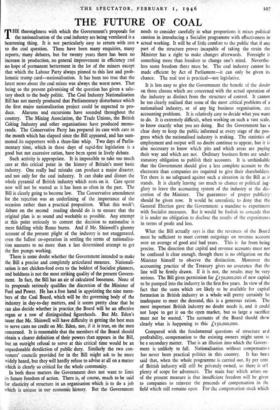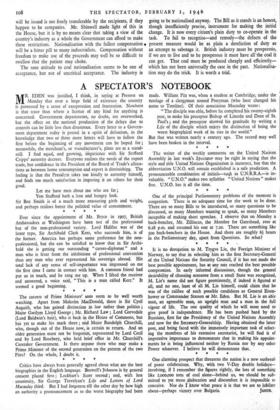THE FUTURE OF COAL
THE thoroughness with which the Government's proposals for the nationalisation of the coal industry are being ventilated is a heartening thing. It is not particularly easy to return with zest to the coal question. There have been many enquiries, many reports,• many debates, but for twenty years there has been no increase in production, no general improvement in efficiency and no hope of permanent betterment in the lot of the miners except that which the Labour Party always pinned to this last and prob- lematic trump card—nationalisation. It has been too true that the latest news about the coal mines was always the worst news. That being so the present galvanising of the question has given a salu- tary shock to the body politic. The Coal Industry Nationalisation Bill has not merely produced that Parliamentary disturbance which the first major nationalisation project could be expected to pro- duce. Alarums and excursions have sounded throughout the country. The Mining Association, the Trade Unions, the British Coking Industry and other organisations have produced memo- randa. The Conservative Party has prepared its case with care in the month which has elapsed since the Bill appeared, and has sum- moned its supporters with a three-line whip. Two days of Parlia- mentary time, which in these days of rapid-fire legislation is a good but not excessive ration, have been spent in lively debate.
Such activity is appropriate. It is impossible to take too much care at this critical point in the history of Britain's most basic industry. One really bad mistake can produce a major disaster, and not only for the coal industry. It can shake and distort the whole pyramid of British industry which rests on it. Care spent now will not be wasted as it has been so often in the past. The Bill is clearly going to become law. The Conservative amendment for the rejection was an underlining of the importance of the occasion rather than a practical proposition. What this week's debate on the second reading should do is to ensure that the original plan is as sound and workable as possible. Any attempt at this point seriously to contest the decision to nationalise is mere fiddling while Rome burns. And if Mr. Shinwell's gloomy account of the present plight of the industry is not exaggerated, even the fullest co-operation in settling the terms of nationalisa- tion amounts to no more than a last determined attempt to get the fire pumps working.
There is some doubt whether the Government intended to make the Bill a precise and completely articulated measure. Nationali- sation is not chicken-feed even to the boldest of Socialist planners, and boldness is not the most striking quality of the present Govern- ment. In fact, the Bill has an air of calculated looseness. None of its proposals seriously qualifies the discretion of the Minister of Fuel and Power. He has a free hand in appointing the nine mem- bers of the Coal Board, which will be the governing body of the industry in day-to-day matters, and it seems pretty clear that he can also decide whether in practice,the Board will be an effective organ or a row of distinguished figureheads. But Mr. Eden's taunt that Mr. Shinwell will have difficulty in getting the best men to serve casts no credit on Mr. Eden, nor, if it is true, on the men concerned. It is reasonable that the members of the Board should obtain a clearer definition of their powers than appears in the Bill, but an outright refusal to serve at this critical time would be an unpardonable dereliction of public duty. Similarly the two con- sumers' councils provided for in the Bill might ask to be more widely heard, but they will hardly refuse to advise at all on a matter which is clearly so critical for the whole community.
In both these matters the Government does not want to limit its future freedom of action. There is, of course, much to be said for elasticity of structure in an organisation which is to do a job which is unique in our economic history. But the Government needs to consider carefully in what proportions it mixes political caution in introducing a Socialist programme with effectiveness in • actual working. It will be of little comfort to the public that if any part of the structure proves incapable of taking the strain the Minister has a right to make changes afterwards. Foresight is something more than freedom to change one's mind. Neverthe- less some freedom there must be. The coal industry cannot be made efficient by Act of Parliament—it can only be given its chance. The real test is practical—not legislative.
It is less easy to give the Government the benefit of the doubt on those clauses which are concerned with the actual operation of the industry as distinct from the structure of control. It cannot be too clearly realised that some of the most critical problems of a nationalised industry, or of any big business organisation, are accounting problems. It is relatively easy to decide what you want to do. It is extremely difficult, when working on such a vast scale, to know exactly what you are doing. But the Government has a clear duty to keep the public informed at every stage of the pro- gress which the nationalised industry is making. The statistics of employment and output will no doubt continue to appear, but it is also necessary to know which pits and which areas are paying their way and which are not. Ordinary business firms are under statutory obligation to publish their accounts. It is unthinkable that the Government should give a less complete account to the electorate than companies are required to give their shareholders. Yet there is no safeguard against such a situation in the Bill as it stands. It is clearly leaving too much to chance or political jug- glery to leave the accounting system of the industry at the dis- cretion of the Minister. The guarantees of proper publicity- should be given now. It would be unrealistic to deny that the General Election gave the Government a mandate to experiment with Socialist measures. But it would be foolish to concede that it is under no obligation to disclose the results of the experiments in terms of profit and loss.
What the Bill actually says is that the revenues of the Board must be sufficient to meet current outgoings on revenue account over an average of good and bad years. This is far from being precise. The direction that capital and revenue accounts must not be confused is clear enough, though there is no obligation on the Minister himself to observe the distinction. Moreover the accounting practice of the Treasury gives no assurance that the line will be firmly drawn. If it is not, the results may be very serious. The Bill gives permission for £150,000,000 of new capital to be pumped into the industry in the first five years. In view of the fact that the sums which are likely to be available for capital formation in British industry as a whole will pretty certainly be inadequate to meet the demand, this is a generous ration. The most important British industry no doubt needs it, and it could not hope to get it on the open market, but so large a sacrifice must not be wasted. • The accounts of the Board should show clearly what is happening to this £150,000,000.
Compared with the fundamental questions of structure ar d profitability, compensation to the existing owners might seem to be a secondary matter. That is an illusion into which the Goverr - ment is unlikely to fall. Nationalisation without compensatio has never been practical politics in this country. It has beet said that, when the whole programme is carried out 85 per cent. of British industry will still be privately owned, so there is sol plenty of scope for adventure. The main fear which arises ou: of the present measure is that insufficient freedom will be giver, to companies to reinvest the proceeds of compensation in the field which still remains open. For the compensation stock which will be issued is not freely transferable by the recipients, if they happen to be companies. Mr. Shinwell made light of this in the House, but it is by no means clear that taking a view of the country's industry as a whole the Government can afford to make these restrictions. Nationalisation with the fullest compensation • will be a bitter pill to many industrialists. Compensation without freedom to make use of the proceeds may well be so difficult to swallow that the patient may choke.
The sane attitude to coal nationalisation seems to be one of acceptance, but not of uncritical acceptance. The industry is going to be nationalised anyway. The Bill as it stands is an honest, though insufficiently precise, instrument for making the initial change. It is now every citizen's plain duty to co-operate in the task. To fail to recognise—and remedy—the defects of the present measure would be as plain a dereliction of duty as an attempt to sabotage it. British industry must be prosperous, if we are to live and to be prosperous it must have all' the coal it can get. That coal must be produced cheaply and efficiently— which has not been universally the case in the past. Nationalisa- tion may do the trick. It is worth a trial.



























 Previous page
Previous page